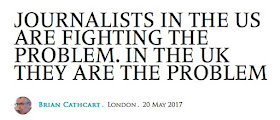Kelvin MacKenzie, asked by Katrin Bennhold of the New York Times what headline he would like to see in the Sun were he still in charge: “ 'I think the fake news headline that would give this country the most joy,' he replied cheerfully, would be ‘Jeremy Corbyn Knifed to Death by an Asylum Seeker'.”
Bennhold adds: (The next morning, I got a text message from Mr. MacKenzie: “Hi Katrin, Can you change that perfect headline from ‘Jeremy Corbyn knifed to death by asylum seeker’ to ‘Jeremy Corbyn Defrauded by Asylum Seeker.’ In the light of Jo Cox murder mine is in tol poor taste.”)
Kelvin MacKenzie in the Spectator: "During the height of the Rossgate furore I texted Tony Gallagher, the bloody good editor of the
Sun. He replied: ‘In church. Will be free in a few minutes.’ How times have changed. In my more louche period as editor of that fine organ, I would reply: ‘In brothel. Will be free in a few seconds'."
The Times [£] in a leader on MPs condemning social media giants for publishing terrorist propaganda and racist content: "Social media companies have indicted themselves at every stage of this scandal. It is indecent that they should have published any of this content in the first place. That they have profited by hosting it is all the more obscene. It is worse still that they have failed to take down material that is not only immoral but illegal, too. Their consistent refusal to devote more resources to moderating the content they publish betrays a reckless and cynical mindset in which any considerations of social or moral responsibility are subjugated by the profit motive."
Michael Heseltine in The Observer: "I am appalled by people who pretend to regret the decline in standards of public life and only exacerbate them. The bigotry of the editor of the
Daily Mail, coupled with that of Nigel Farage, have been among the most potent driving forces of this tragedy."
News Media Association chairman Ashley Highfield announcing the Fight Fake News campaign: “The critical role of local newspapers in providing local communities with highly trusted news and advertising platforms is even more important than ever in the run up to the general election. Through their reporting, local newspapers uphold, promote and support democracy, fighting against the fake news which undermines and subverts it. We must champion the vital democratic function of local newspapers now, more than ever."
Ian Hislop, editor of Private Eye, after being named Print Journalist of the Year by the London Press Club: "Print journalism is not dead. Print journalism is alive and kicking. Journalism is worth doing and it's worth paying for."
Film director Ken Loach claiming BBC's Nick Robinson is biased towards the Tories after he tweeted that about Jeremy Corbyn being “long on passion and short on details”, as reported by The Times [£]: “That’s the partiality of the BBC. That’s the bias we have to complain about. That’s what we have to fight....The important point is that Nick isn’t fit to interview Jeremy.”
Nick Robinson responds to Ken Loach in The Times [£]: “I judge Ken Loach by the quality of the work he produces. He is a great filmmaker. He should judge me in the same way — by the interviews I do, which I endeavour to make both rigorous and impartial.”
From the Financial Times: "The
Guardian newspaper is considering a move from London to the historic Granada TV studios in Manchester and has made inquiries about temporary city centre apartments to tempt its staff to move north."
George Osborne@George_Osborne on Twitter: "Excited about first day in new job
@EveningStandard. Without fear or favour we'll provide the facts & analysis - and entertain along the way."
Peter Barron @PeteBarronMedia on Twitter: "George Osborne's 1st day at the
Standard. On my 1st day on a paper they had me checking sales of dehydrated water. Go on - do it to George!"
Letter to George Osborne from chair of the Advisory Business Appointments Committee: "You should have no contact with Government on matters relating to press regulation; and for two years from your last day in ministerial office you should not become personally involved in lobbying the Government on behalf of the
Evening Standard or its parent company ESI Media."
[£]=paywall





































